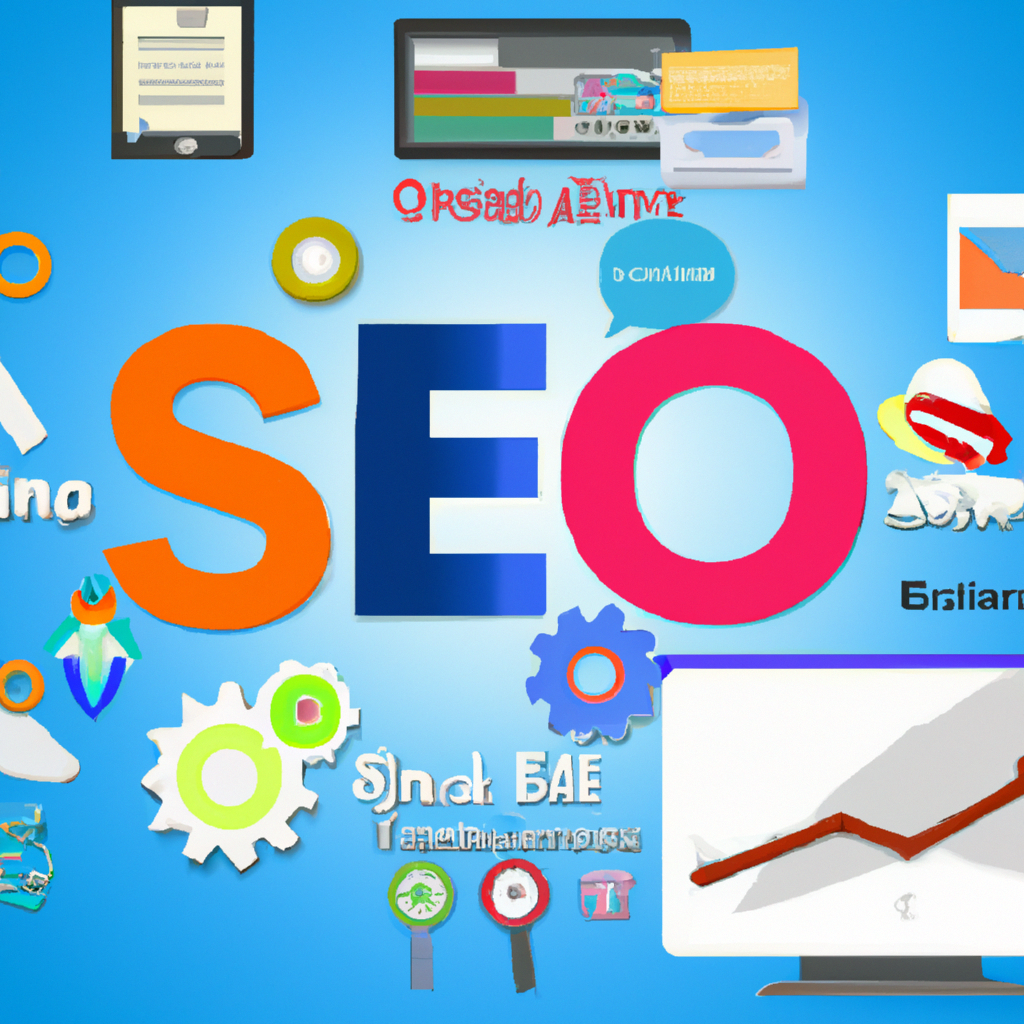
Have you ever wondered how search engine optimization (SEO) works? In a nutshell, SEO is the process of improving a website’s visibility and ranking on search engine results pages (SERPs). By optimizing various aspects of a website, such as its content, structure, and keywords, SEO helps search engines understand and index the site better. This, in turn, increases organic traffic and leads to higher visibility and potential conversions for businesses. So, let’s take a closer look at how SEO works and how it can benefit your online presence.

Understanding Search Engine Optimization (SEO)
Search Engine Optimization (SEO) is a crucial aspect of digital marketing that involves optimizing your website to improve its visibility and rankings in search engine results pages (SERPs). By implementing SEO strategies, you can attract more organic traffic to your website and increase your online presence.
What is SEO?
SEO can be defined as the practice of optimizing a website to enhance its visibility and rankings in search engine results. It involves various techniques and strategies that aim to improve the relevance and authority of a website in the eyes of search engines like Google, Bing, and Yahoo.
Importance of SEO
In today’s digital age, where competition in the online marketplace is fierce, having a well-optimized website is essential for business success. Here are a few reasons why SEO is important:
-
Increased Visibility: By optimizing your website, you can ensure that it appears prominently in search engine results, making it more likely for users to click on your website and explore your offerings.
-
Targeted Traffic: SEO helps you attract relevant and targeted traffic to your website. By optimizing your website for specific keywords and phrases, you can attract users who are actively searching for products or services related to your business.
-
Cost-Effective Marketing: Compared to traditional forms of advertising, SEO is a cost-effective marketing strategy. Once your website is optimized, the organic traffic generated is free, reducing your overall marketing expenses.
-
Brand Authority: Higher rankings in search engine results establish your brand’s credibility and authority in your industry. Users trust websites that appear on the first page of search results, leading to improved brand reputation and trustworthiness.
-
Long-Term Results: While SEO requires continuous effort and optimization, the results can be long-lasting. With proper maintenance and updates, your website can maintain its rankings, ensuring a consistent flow of organic traffic.
Key Components of SEO
Search engine optimization consists of various components and factors that contribute to improving a website’s visibility and rankings. Here are the key components of SEO that you need to focus on:
On-Page Optimization
On-Page Optimization refers to the process of optimizing individual web pages to improve their search engine rankings and drive organic traffic to your website. Here are the key elements of on-page optimization:
Title Tags
Title tags are HTML elements that define the title of a web page. They play a crucial role in SEO as they provide a concise and accurate description of the content on a page. Optimizing title tags with relevant keywords can help search engines understand the context and relevance of your page.
Meta Descriptions
Meta descriptions are HTML attributes that provide a summary of a web page’s content. While they don’t directly impact search engine rankings, well-crafted meta descriptions can entice users to click on your website in search results, increasing the click-through rate (CTR).
Header Tags
Header tags, such as H1, H2, H3, etc., are HTML elements that structure the content on a web page. They not only make the content visually appealing and easier to read for users but also provide search engines with valuable information about the page’s key topics and sections.
URL Structure
A well-structured URL that includes relevant keywords can improve the chances of your page ranking higher in search results. Use descriptive and keyword-rich URLs that accurately represent the content on the page.
Keyword Usage
Strategically incorporating relevant keywords throughout your website’s content is crucial for SEO. However, it’s important to maintain a natural flow and avoid keyword stuffing, as search engines may penalize over-optimized content.
Internal Linking
Internal linking involves linking one page of your website to another within the same domain. This practice helps search engines understand the structure and hierarchy of your website, improving indexation and creating a positive user experience.
Page Load Speed
Page load speed is a critical ranking factor that impacts both user experience and SEO. Optimizing your website’s performance by reducing page load times ensures that users can access your content quickly, reducing bounce rates and improving search engine rankings.
Off-Page Optimization
Off-Page Optimization refers to the actions taken outside of your website to improve its rankings in search engine results. Here are the key elements of off-page optimization:
Backlinks
Backlinks are links from other websites that point to your website. They act as a vote of confidence for your content and help search engines determine the relevance and authority of your website. Obtaining high-quality backlinks from reputable sources is crucial for off-page optimization.
Social Signals
Social signals include likes, shares, comments, and other forms of engagement on social media platforms. While they may not directly impact search engine rankings, social signals contribute to brand visibility, user engagement, and indirectly influence SEO.
Brand Mentions
Brand mentions occur when your brand or website is mentioned on other websites, even without a backlink. These mentions help improve brand visibility, establish credibility, and can indirectly contribute to improving search engine rankings.
Online Reputation Management
Online reputation management involves monitoring and managing your brand’s online presence and reputation. By addressing negative reviews, managing customer feedback, and maintaining a positive online image, you can improve your brand’s reputation and indirectly enhance your SEO efforts.
Technical SEO
Technical SEO focuses on the infrastructure and technical elements of your website that impact search engine rankings. Here are the key elements of technical SEO:
Site Structure
A well-structured website with clear hierarchy and navigation makes it easier for search engines to crawl and understand your content. A logical site structure enhances indexation and improves user experience.
Crawling and Indexing
Search engines use bots, also known as spiders or crawlers, to discover and index web pages. Ensuring that your website is easily crawlable and indexable allows search engines to understand and rank your content properly.
XML Sitemaps
XML sitemaps provide search engines with a list of all the pages on your website that you want them to crawl and index. Creating and submitting an XML sitemap helps search engines discover and understand your website’s structure more efficiently.
Website Speed and Responsiveness
Website speed is a crucial ranking factor. Optimizing your website’s speed and ensuring that it is responsive across different devices will not only improve user experience but also contribute to higher search engine rankings.
Mobile Optimization
With the increasing use of mobile devices for online browsing, having a mobile-optimized website is essential. Mobile optimization involves designing and developing your website to provide a seamless user experience on mobile devices, ensuring higher search engine rankings.
SSL Certificates
SSL (Secure Sockets Layer) certificates encrypt the communication between a website and its visitors, ensuring data security. Implementing SSL certificates not only protects user data but also contributes to higher search engine rankings, as search engines prioritize secure websites.
Schema Markup
Schema markup is a structured data markup language that enables search engines to understand and interpret the content on your website more effectively. Implementing schema markup can enhance search engine visibility and result in rich snippets in search results.
Canonical URLs
Canonical URLs specify the preferred version of a webpage when there are multiple versions of the same content. Using canonical tags allows search engines to consolidate signals to the preferred version, preventing duplicate content issues.
Redirects
Redirects are used to send users and search engines from one URL to another. Implementing redirects correctly ensures that users and search engines can access the desired content, preventing broken links and improving SEO.

Keyword Research and Analysis
Keyword research and analysis involve identifying the most relevant and valuable keywords for your website and integrating them into your content. Here are the key elements of keyword research and analysis:
Finding Relevant Keywords
Finding relevant keywords involves using tools and techniques to identify keywords that are highly relevant to your business and have significant search volume.
Competitor Analysis
Analyzing your competitors’ keywords and ranking positions provides valuable insights into the keywords you should target. Understanding their strategies can help you refine your own keyword optimization methods.
Keyword Volume and Difficulty
Keyword volume refers to the average monthly search volume for a keyword. Considering keyword volume and difficulty can help you prioritize keywords that have a higher search volume and less competition.
Long-tail Keywords
Long-tail keywords are specific and more descriptive phrases that have lower search volume but may result in higher conversion rates. Targeting long-tail keywords can help you capture niche markets and attract more qualified traffic.
Keyword Optimization
Keyword optimization involves strategically incorporating relevant keywords into your website’s content, meta tags, and other elements to improve search engine rankings. However, it’s essential to maintain a natural and user-friendly flow while optimizing keywords.
Content Creation and Optimization
Creating high-quality content that is valuable, relevant, and compelling is at the heart of SEO. Here are the key elements of content creation and optimization:
High-Quality Content
Quality content is the foundation of successful SEO. By creating valuable and informative content that meets the needs of your target audience, you can attract more organic traffic and establish your website as an authority in your industry.
Keyword Placement
Strategically placing relevant keywords within your content helps search engines understand the topic and relevance of your content. However, it’s vital to balance keyword usage to maintain a natural flow and avoid keyword stuffing.
Content Formatting
Proper content formatting enhances user experience and search engine visibility. Using headings, bullet points, and images helps break up content, making it easier to read and understand.
User Engagement Signals
User engagement signals, such as bounce rate, dwell time, and click-through rate, indicate how users interact with your content. Creating engaging and valuable content keeps users on your website longer, improving SEO.
Content Length and Relevancy
Longer and more in-depth content tends to rank higher in search engine results. However, it’s crucial to ensure that the length is justified, and the content remains relevant and valuable to the user.
Optimizing Images and Media
Optimizing images and media files with appropriate alt tags, file names, and descriptions improves search engine visibility, as search engines cannot interpret images directly. Additionally, optimized media files enhance user experience by improving page load times.

Local SEO
Local SEO focuses on optimizing your website to appear in local search results. It is particularly important for businesses that rely on local customers. Here are the key elements of local SEO:
Google My Business
Creating and optimizing a Google My Business (GMB) profile is crucial for local SEO. GMB allows you to manage your business information, including your address, phone number, hours, and customer reviews, making it easier for local customers to find you.
Local Citations
Local citations are online mentions of your business’s NAP (Name, Address, Phone number). Consistent and accurate NAP information across various directories, such as Yelp, Yellow Pages, and industry-specific directories, improves your local search visibility.
Online Reviews
Online reviews, especially on platforms like Google, Yelp, and Facebook, play a significant role in local SEO. Positive reviews improve your business’s reputation and rankings in local search results, making it easier for potential customers to trust and choose your business.
Local Keyword Optimization
Optimizing your website’s content and meta tags with location-specific keywords helps search engines understand your business’s relevance to local queries. Incorporating relevant local keywords can improve your visibility in local search results.
Geotargeting
Geotargeting involves targeting specific geographic locations with your marketing efforts. By tailoring your website’s content and advertising campaigns to specific regions, you can attract more local customers and improve local search rankings.
Location Pages
Creating dedicated location pages for each of your business locations allows you to optimize content specifically for a particular area. These pages provide valuable information and help search engines better understand your local relevance.
User Experience and SEO
User experience (UX) plays a crucial role in SEO. Search engines prioritize websites that offer a seamless and positive user experience. Here are the key elements of user experience and SEO:
Mobile-Friendly Websites
With the increasing use of mobile devices for online browsing, having a mobile-friendly website is essential. Responsive design and optimized mobile experiences significantly contribute to improving search engine rankings.
Page Layout and Navigation
Having a well-designed page layout and intuitive navigation are key aspects of a positive user experience. Clear and easy-to-use navigation helps users find the information they need quickly while also improving search engine rankings.
Readability and Accessibility
Creating content that is easy to read and understand is essential for user experience and SEO. Using clear headings, bullet points, and readable font sizes improves content readability, making it more engaging for users and search engines.
Bounce Rate and Dwell Time
Bounce rate is the percentage of users who leave your website after viewing only one page. Dwell time refers to the amount of time users spend on your website. A low bounce rate and longer dwell time indicate an engaging website, which positively impacts search engine rankings.
Site Search
Implementing a site search function allows users to search for specific content within your website. This enhances user experience by enabling users to find relevant information quickly, reducing bounce rates, and improving search engine rankings.

SEO Analytics and Reporting
Tracking and analyzing key performance metrics are vital to measure the effectiveness of your SEO efforts. Here are the key elements of SEO analytics and reporting:
Tracking Performance Metrics
Monitoring performance metrics, such as organic traffic, bounce rate, page views, and conversions, helps gauge the success of your SEO endeavors. Tracking these metrics over time allows you to identify trends, make data-driven decisions, and optimize your website.
Google Analytics
Google Analytics is a free web analytics tool that provides valuable insights into your website’s performance. By setting up Google Analytics and analyzing the data it provides, you can gain a deeper understanding of user behavior, traffic sources, and other critical metrics.
Ranking Reports
Tracking your website’s search engine rankings for target keywords allows you to evaluate the impact of your SEO efforts. Regular ranking reports help identify areas for improvement and measure progress in search engine visibility.
Conversion Tracking
Conversion tracking involves monitoring and analyzing the actions users take on your website that lead to desired goals, such as form submissions, purchases, or newsletter sign-ups. By tracking conversions, you can assess the effectiveness of your SEO strategies in driving desired user actions.
Competitor Analysis Tools
Using competitor analysis tools allows you to gain insights into your competitors’ SEO strategies, keyword rankings, and backlink profiles. Analyzing your competitors can help you identify new opportunities, refine your own strategies, and stay ahead in the competitive landscape.
The Role of SEO in Search Engine Rankings
Understanding the role of SEO in search engine rankings is essential to develop effective optimization strategies. Here are the key elements to consider:
Search Engine Algorithms
Search engine algorithms are complex sets of rules and calculations that determine the relevance and authority of webpages. By understanding how search engine algorithms work, you can align your SEO efforts with their requirements and optimize effectively.
Ranking Factors
Search engines consider various factors when determining the rankings of webpages. These factors include on-page optimization elements, backlinks, user experience, content quality, social signals, and more. Optimizing for these ranking factors ensures your website has the best chance of ranking high in search results.
SEO Best Practices
Following SEO best practices helps ensure that your website meets search engine guidelines and produces the best possible results. Staying up-to-date with algorithm changes, implementing ethical optimization techniques, and providing valuable content are all part of effective SEO practices.
In conclusion, search engine optimization (SEO) plays a crucial role in improving the visibility and rankings of your website in search engine results. By focusing on on-page optimization, off-page optimization, technical SEO, keyword research, content creation, local SEO, user experience, and SEO analytics, you can develop a comprehensive SEO strategy that enhances your website’s online presence and drives organic traffic. Understanding search engine algorithms, ranking factors, and SEO best practices are vital to staying ahead in the competitive online marketplace. Invest in SEO to ensure your website ranks high and attracts relevant traffic, ultimately benefiting your business’s success.



